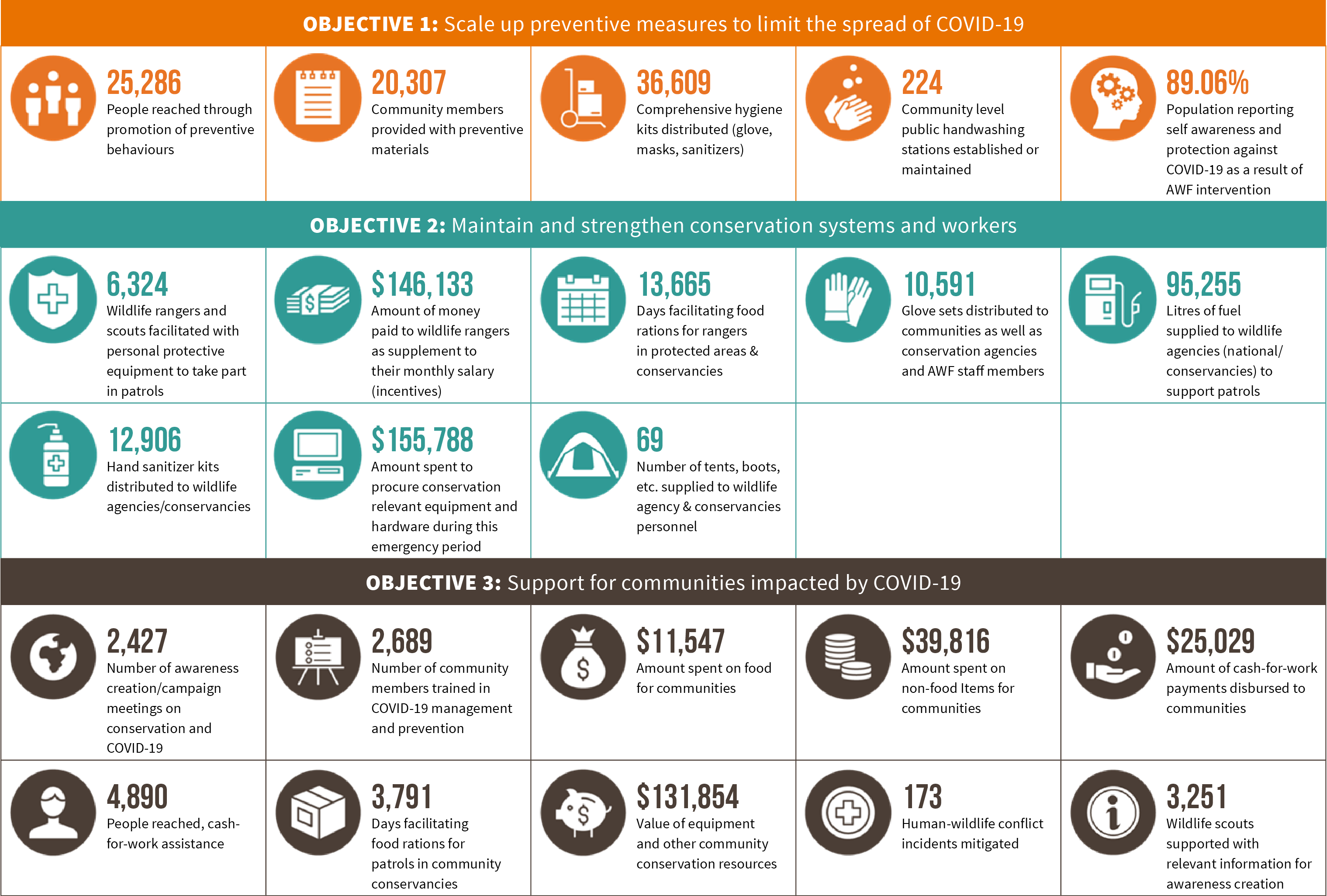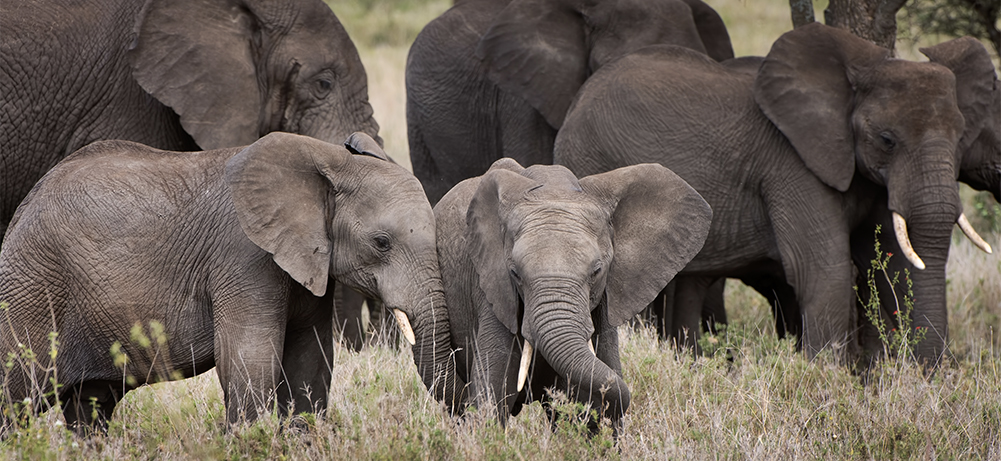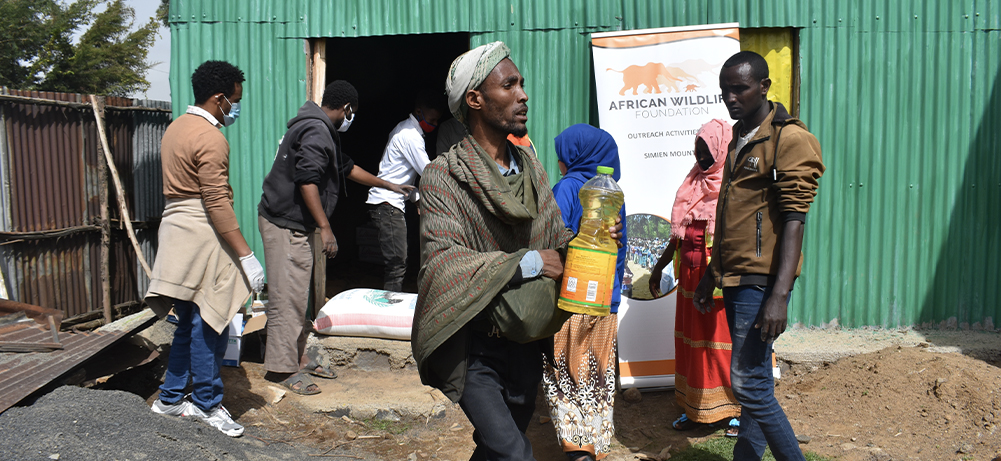COVID-19 Emergency Response
Download COVID-19 Response Close-out Report
Headquartered in Nairobi, Kenya, the African Wildlife Foundation has nearly 60 years of experience working to ensure wildlife and wild lands thrive in modern Africa. As one of the oldest and largest global conservation organizations focused solely on the continent of Africa, AWF is the primary advocate for the protection of African wildlife and wild lands.
AWF works across the continent of Africa, developing African conservation leadership and implementing programs that focus on safeguarding areas of high conservation value through a holistic suite of programs that conserve wildlife, protect land, improve the lives of local people — and leverage conservation enterprises to promote sustainable economic growth that does not come at the expense of Africa’s natural heritage.
Impact from the Field


The threat to Africa’s wildlife and wild lands
For those of us working in conservation, COVID-19 has been an unfortunate but important reminder of the linkages between pandemics, which are often zoonotic in nature and the illegal wildlife trade — a challenge that AWF has been working for decades to combat. Contact between humans and wildlife, whether due to human consumption or human incursion into wild places, poses a severe risk in the spread of zoonotic disease. Previous pandemics have been linked to these activities, and scientists hypothesize that the COVID-19 pandemic is also linked to a large live animal market. This pandemic spread quickly across cities and nations. Due to the ease of movement in today's world, we are all vulnerable. Disruptions of global supply chains have impacted economies and the ability to respond to the crisis adequately, even for advanced economies. When the proverbial ‘dust settles’, this global pandemic will have damaged countries, cities, communities, and families, and significantly impacted Africa’s wildlife and wild lands. We stand to lose many of the conservation gains that have been hard fought for and often taken decades to nurture.
A unique impact on African conservation
As of June 1, 2020, global COVID-19 cases numbered over 6 million, with over 370,000 resulting in deaths. While COVID-19 started taking a toll on the African continent much later than it did other regions, to date, Africa is reporting over 104,000 cases and 2,638 deaths. Strategies employed elsewhere, such as lockdowns, social distancing, and isolation, are being implemented by African nations, as well, but these solutions come with significant social, economic, and conservation impacts.
Those who have dedicated their lives to protecting Africa’s natural resources, including communities that live with wildlife or adjacent to protected areas, are paying a heavy price due to loss of livelihoods derived from the travel and tourism industry. Protected areas and conservation programs that rely on tourism revenues are also in danger as funding dwindles.
There are also early indications that poaching will increase during this time. Communities may turn to nature for their livelihoods or as a source of food — and opportunists can take advantage of the reduced focus on security to pursue commercial poaching of elephant, rhino, and other valuable species.
It is too soon to tell the full extent of the damage wrought by COVID-19, but it will most certainly be vast — impacting livelihoods, economies, wildlife, and wild lands in the long term.

AWF’s COVID-19 Emergency Response
In the face of this challenge, AWF is committed to increasing our investment and support through our AWF COVID-19 Emergency Crisis Response to ensure that Africa’s wildlife, wild lands, and people remain resilient in the face of this global pandemic and beyond.
A promise to continue protecting wildlife, communities, and wild lands during COVID-19
Those on the front lines, including rangers, scouts, community leaders, entrepreneurs, conservation farmers, and other stakeholders vital to the survival of wildlife and protected areas are determined to weather the storm. Through strategic and targeted support, AWF and our partners will provide financial and material relief to enable these important workers and communities to protect conservation gains and mitigate the threats posed by the pandemic. COVID-19 is severely depleting national budgets — impacting funding for conservation programs and protected area management. Wildlife and wild lands stand to be lost if these investments are not made to continue critical services within and around protected and conserved areas. Furthermore, safeguarding the livelihoods of affected communities around key biodiversity areas strengthens wildlife conservation as communities act as the first line of defense in the conservation of nature preserves. Initially, AWF’s COVID-19 Emergency Crisis Response will seek to address urgent needs, including pain points of protected area authorities, conservancies, local institutions, and communities. The program will give support in ways that strengthen coping mechanisms to the crisis and look to save the critical functions of protected areas, while also safeguarding livelihoods of communities.
Support protected area authorities:
- Maintain patrols of protected areas and conservancies Support basic healthcare through hand-washing stations, sanitizer, soap, gloves and masks and education on COVID-19
- Engage with communities to foster increased communication and problem solving Immediate funds for employees to build, fix, rehabilitate park infrastructures such as ranger stations and tourism sites
- Bolster AWF’s Canines for Conservation program to deter potential wildlife trafficking at checkpoints.
Support communities engaged in wildlife and tourism:
- Bolster ranger and scout salaries with stipends and resources to ensure ongoing protection of wildlife
- Educate communities on human-wildlife-conflict mitigation
- Support livelihood programs for scouts and their families Cash for work programs for those affected by decline in tourism.
- Support to entrepreneurs to help overcome disruptions.
Support communities outside wildlife and tourism industries:
- Sustainable agriculture support to improve food security
- General health and sanitation support
- Help local enterprises and markets to build ecologically resilient businesses through cocoa and chili farming
- Support tree nurseries and tree planting Expanding awareness of local environmental issues through radio broadcasts.
A post COVID-19 resilience framework for nature and people
Assuming the COVID-19 crisis runs its course across the world, we anticipate disruption of systems across all nations to varying degrees. The World Bank predicts that Africa will be facing its first recession in 25 years, which will have implications for all dimensions of society, nature, and economy. At the core of AWF’s work, we strive to deliver sustainable solutions that provide both conservation and socio-economic benefits. To further develop economic resilience for the nations and communities with which we work, and, in turn, ensure the resilience of Africa’s wildlife and wild lands, AWF will also support governments on sustainable, long-term policy-and economic-based solutions to mitigate the effects of COVID-19 and prevent future crises of this scale.
Coordinate and galvanize an African voice and position on the crisis response:
- Facilitating, supporting, and contributing to the coordination and collaborative measures across sectors towards recovery strategies and plans for COVID-19
- Engaging in coalitions to support policy and financing toward Africa’s priorities
- Promoting increased investments to nature conservation and to communities living around protected and conserved areas as a way of safeguarding environmental and public health Increasing coordination and collaboration of bilateral and multilateral agencies in finding solutions to the COVID-19 crisis both in the near term and the long term.
Provide thought-leadership on the crisis and its relationship to conservation:
- Gather, synthesize, filter, and share information on COVID-19 for partners and communities
- Work together with partners to use available sources and technology to gather information on the status of biodiversity and ecosystems
- Provide on-the-ground level evidence of the effects and implications of the crisis on protected and conserved area’s and on local communities. Use available technology and authentic African storytellers to develop and to tell stories of frontline conservation personnel (rangers, guides, wardens) and of nature conservation in a manner that speaks to today’s audiences.
Contribute to the establishment of emergency preparedness and response policies, standards, measures, and guidelines to manage of current and future pandemics:
- Bring together key players and actors to establish emergency preparedness policies and plans
- Establish clear measures, standards, and guidelines to support emergency preparedness and response policies and plans
- Engage in strategic platforms to share proposed policies and measures and promote their adoption.
Contribute to an awareness campaign on zoonoses and preventive measures required at community levels:
- Establish a communications awareness strategy on zoonosis prevention as well as safeguard measures
- Design an outreach plan that engages with communities, protected area authorities, and other key stakeholders.
These strategic interventions will alleviate the strain on African economies, communities, and natural resources, ensuring biodiversity conservation is an integral part of both COVID-19 mitigation measures and socioconomic, development, and policy strategies moving forward.